









Welcome to The Faces of Justice report, a showcase of state court judges who bring professional and personal diversity to our courts Each issue will hone in on and uplift different state court judges of various backgrounds.

95%
of all lawsuits in the United States are filed in state courts, giving them an outsized impact on ourrights, laws, and
livelihoods. Accordingly, it is critical these courts ensure that a diverse and representative range of lived experiences is reflected on the bench. This report highlights the presence of Black state supreme court justices throughout the country, spotlighting the historic first Black justices on each state supreme court and following the continued progress these courts have made, while also addressing the nearly one-third of state supreme courtsthathaveneverhadaBlackjustice.
The first Black justice to serve on any state supreme court was Jonathan Jasper Wright, appointed to the South Carolina Supreme Court in 1870. It would take nearly a century for the second Black state supreme court justice to be appointed, when Otis Smith was appointed to the Michigan Supreme Court in 1960 From there, it then took nearly another thirty years for the first Black woman to serve on a state supreme court with the appointment of Juanita Kidd Stout to the PennsylvaniaSupremeCourtin1988
This vast gap in Black representation on our state benches opened the door for racial discrimination to become further entrenched in our courtrooms and our laws, deepening already stark divides in our state-level justice systems Securing diversity on our courts not only ensures that the experiences of the country are accurately reflected in the judicial process, but also increases confidence in these institutions This is essential in moving us towards a justice system that truly preservestherightsofallindividuals

The history of racial discrimination in America particularly against Black people is intrinsically tied to the country’s founding and continues to impact our culture and society today. A commitment to codifying racial discrimination and inequality can be found in countless founding documents, laws, and court decisions across the states, baking racism and inequality into the systems and structures our society was built on for centuries to come including in limiting access to thebenchesofhighcourtsthroughoutthecountry.
Macon Bolling Allen was the first Black person in the United States to be admitted to the practice of law after he passed the bar exam for noncitizens in Maine in 1844. However, Allen’s admission to the Maine bar was on his second attempt at admission. His first attempt was rejected due to questions about his citizenship because even though Maine had expanded protections like voting rights to Black people living in the state, he was still ineligible to legally become a citizen. There were also questions over his state of residency, because he lived at times in both Massachusetts and Maine. Then, even on his second attempt under the noncitizen bar exam, Allen’s admission still met with racist opposition from multiple bar committee members refusing to respect his legal education and qualifications. Allen later returned to Massachussetts and was admitted to the state bar in 1845. Twenty-five years later, Jonathan Jasper Wright was elected the first Black state supreme court justice in the country in 1870, five years after the end of the Civil War. By the time Justice Wright was impeached and later forced from the bench in 1877 on trumped up corruption charges leveled by antiBlack, anti-Reconstructionist opponents, Jim Crow wasinfulleffect, anditwouldbenearlyacentury
before another state, Michigan, would put a Black judgeonitshighestbench.
During this time, Black Americans did not have accesstothefranchiseortorepresentationintheir state legislatures and the United States Congress, as Jim Crow policies institutionalized second-class citizenship. These laws were used throughout the Jim Crow era to hold back the advancement of Black Americans, including with U.S. Supreme Court decisions such as Plessy v. Ferguson, which established the ”separate but equal” legal doctrine that would be used to justify profoundly racist policieslimitingaccesstohousing, education, jobs, and more until the civil rights movement in the 1960s. With the civil rights movement came the recognition that a fair judiciary must reflect the nation’s population, and efforts have been made in recent decades to diversify courts across the country, bringing Black state supreme court justices to multiple states for the first time. These efforts have brought expanded backgrounds and lived experiences to our courts and paved the way for new viewpoints and approaches to interpreting andapplyingourlaws.
ofBlackstatesupremecourtjusticesserved aslowercourtjudgesbeforebeingappointed orelectedtotheirstate’shighestcourt.
havegoneontobenominatedandconfirmedtoa federaldistrictcourtorcourtofappealsafterserving ontheirstate’ssupremecourt.
Blackstatesupremecourtjusticesservedin theirstate’slegislaturebeforejoiningthe bench
ofallBlackstatesupremecourtjusticesworkedas movementlawyers thatis, lawyerswhohave dedicatedtheirworktothecommongood before goingontoserveintheirstate’sjudiciary, withmany workingforlegalaidorganizations, aspublic defenders, andascivilrightslitigators
Three eventual justices were plaintiffs in cases that challenged segregation and racial discrimination George Bundy Smith, who later went on to join the New York Court of Appeals (New York’s highest court) in 1992, was part of a group of freedom riders who were arrested in a Montgomery, Alabama bus station and charged with breach of peace Their convictionswerelateroverturnedbytheUS SupremeCourtinaunanimousdecisionin Abernathyv Alabama (1965).
Robert M. Bell, who later became a justice of the Maryland Court of Appeals in 1991 (now the Supreme Court of Maryland), was arrested and charged with trespassing as a law student for refusing to leave a cafe after he was refused service. His conviction was later vacated in a U.S. Supreme Court decision in Bellv. Maryland (1964), in which Bell was the lead plaintiff. And Robert Glass, who would go on to serve as the first Black justice of the Connecticut Supreme Court in 1987, was part of a group of students who filed a lawsuit against the University of North Carolina School of Law after it rejected his application for admission due to his race The plaintiffs prevailed in the Fourth Circuit Court of Appeals in McKissickv Carmichael (1951), which ordered the law school to admit the Black students The US SupremeCourtdeclinedtohearanappealtothedecisionlaterthatyear, andthestudentswereadmitted
Seven Black Justices
No Black Justices
One Black Justice
Two Black Justices
Three Black Justices
Four Black Justices
Five Black Justices
Six Black Justices
Seven Black Justices
Fifteen states (30%) have never had a Black justice on their supreme court bench. Seven states (14%) have had only one Black justice, and 20 states (40%) have had three or fewer. Of the states that have had three or fewer, nearly half have populations that are more than 10% Black. Seventeen state supreme courts have had a Black chief justice, with Oklahoma having had a Black chief justice on both of its highest courts. Only one state (Georgia) has had three Black chiefjustices, andnostatehashadmorethanthree.
The vast majority of all Black state high court justices 86% were appointed to their state supreme court by the governor of their state. Of these, 73% were appointed by governors from the Democratic Party, 25% were appointed by Republicans, and 2% were appointed by governors from other parties. Notably, 17 of these states utilize judicial elections as their primary selection methods. Three justices (3%) were appointed by their state’s legislature (South CarolinaandVirginia). Threejustices (3%) wereappointedbytheirstate’ssupremecourt (Illinois).
Alaska, Arizona, Hawaii, Idaho, Iowa, Kansas, Montana, Nebraska, New Hampshire, New Mexico, North Dakota, South Dakota, Utah, Vermont, and Wyoming have never had a Black justice on their highest court.
Colorado, Kentucky, Maine, Oregon, Rhode Island, West Virginia, and Wisconsin have had only one Black justice on their highest court
Alabama, Louisiana, Minnesota, New Jersey and Pennsylvania have had three Black justices Delaware, Indiana, Mississippi, Nevada, Oklahoma, South Carolina, Tennessee, and Washington have had two Black justices
Arkansas, Georgia, Kentucky, Michigan, Minnesota, Mississippi, Nevada, Oregon, Washington, and West Virginia elect their justices in non-partisan elections Alabama, Illinois, Louisiana, North Carolina, Ohio, Pennsylvania, and Texas elect their judges in partisan elections
Only 9% of Black state supreme court justices were directly elected by voters (Ohio, North Carolina, Illinois, Louisiana, Minnesota, and Texas). Of the justices who were initially appointed, 56% were required to run for election or retention to a full term on the court. Of these, 15% lost election to a full term, while 85% were elected to a full term on the court. Four of those justices lost their subsequent campaign for another term. 32% of appointed justices served less than two years, eventhoughtheshortestfullstatesupremecourttermissixyearsandthelongestis15years
Some states are doing better than others at ensuring that their Black citizens are represented on their state’s highest court. While 7.22% of the population in California is Black, it has had six Black justices since 1977, with a Black justice sitting on that bench for 32 of the last 47 years. With a Black population of 17.44%, New York has had seven Black judges on its high court, and has had a Black judge on the Court of Appeals for 38 of the last 50 years. 15.18% of Michigan’s population is Black, and the state has had six Black justices and a Black justice on the bench for 39 of the past 63 years. In North Carolina, 21.8% of the population is Black, and North Carolina’s supreme court has had seven BlackjusticesandaBlackjusticeonitsbenchfor37ofthepast41years.
By contrast, some of the states with the highest Black populations in the nation have had few Black justices serve on their state’ highest court. Despite having a 15.99% Black population, none of the Arkansas Supreme Court’s six Black justices all of whom were appointed have served on the court for more than two years (despite term lengths of eight years), meaning there has only been a Black justice on that court for eight of the past 47 years. In Louisiana, where 34.23% of the population is Black, only three justices have ever served on the Louisiana Supreme Court, accounting for only 14 of the past 32 years. Alabama’s Black population is 26.23%, but its supreme court has had a Black justice for only 11 of the past 44 years. South Carolina had the nation’s first Black state supreme court justice from 1870 to 1877; its next (and most recent) state supreme court justice did not join the bench until 2007 and must retire in 2024. Delaware’s first of two Black justices did not join its supreme court until 2019, despite the state having a Blackpopulationof22.24%.
Before 1960, only one state (South Carolina) had had a Black state supreme court justice. Between 1961 and 1980, nine states elected or appointed Black justices to their state supreme courts. Between 1981 and 2000, 45 Black justices joined state supreme courts, and 60 justices joined state supreme courts after 2000. Today, 35 Black justicesserveon25statesupremecourtsacrossthecountry.
Before1960
1961-1980
1981-2000
After2000
Walkingchronologicallythrougheachstate’s first Black state supreme court justice, this sectionofthereportboldlyconfrontsthestark realities of racial disparities within the judiciary, focusing on the often-overlooked journey of Black individuals in attaining positions of power and influence as state supreme court justices Through an unflinching examination, it exposes the systemic barriers and injustices that have historically hindered the progress of Black judges, shedding light on the profound underrepresentation and misrepresentation prevalent in state courts across the nation
Fromthepioneeringbreakthroughsofthefirst Black state supreme court justices to the persistent struggles for equitable representation, this analysis lays bare the harsh realities and urgent imperatives for dismantling systemic inequalities within the legallandscape.
Jonathan Jasper Wright
Associate Justice (1870-1877)
In 1870, Jonathan Jasper Wright became the first Black person to serve as a justice on any state supreme court in the country with his legislative election to the South Carolina Supreme Court Following his education at the Lancasterian Academy, he taught and read law in Pennsylvania However, Wright was denied admission to the Pennsylvania bar He then moved to South Carolina where he advised and taught formerly enslaved people Following the passage of the Civil Rights
1870 -
Act of 1866, Wright applied for

admission to the Pennsylvania bar again and was granted admission, making him Pennsylvania’s first Black attorney. Wright then returned to South Carolina and became involved in politics, being sent to the South Carolina Constitutional Convention and later elected to the state Senate The legislature elected him in 1870 to join the state supreme court However, a change in political control of the legislature led to partisan and racist impeachment efforts against Wright, and he was forced to resign from the bench in 1877 Wright died in 1885 of tuberculosis
After Justice Wright’s forced resignation in 1877, there was no Black justice on the South Carolina Supreme Court until the election of Justice Donald Beatty 130 years later in 2007.
Donald W. Beatty
Associate Justice (2007-2017) | Chief Justice (2017-Present)
Chief Justice Donald W. Beatty is the first Black chief justice of the South Carolina Supreme Court. He was born and raised in Spartanburg County, South Carolina, and attended South Carolina State University and the University Of South Carolina School of Law. In 1979, he began his legal career at the Neighborhood Legal Assistance Program, then worked in private practice while serving on the Spartanburg City Council and later in the South Carolina House of Representatives He was elected as a Circuit Court judge in 1995 and joined the South Carolina Court of Appeals in 2003 He was elected to the South Carolina Supreme Court in 2007 and began his term as chief justice in 2017 Chief Justice Beatty will reach the state’s mandatory retirement age of 72 in April 2024 and must retire from the court by the end of this year
Term ends: July 2024
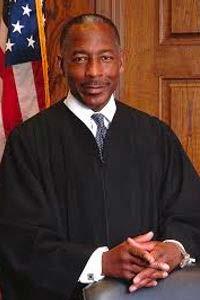
Otis M. Smith
Associate Justice (1961-1965)
Following his appointment to the Michigan Supreme Court by Governor John Swainson (D) in 1961, almost 90 years after the appointment of the country’s previous Black state supreme court justice, Otis Smith became Michigan’s first Black justice Smith graduated from Catholic University Law School and started his legal career first in private practice and later as an assisting prosecuting attorney In 1956, Governor G Mennen Williams (D) appointed Smith as Chairman of the Michigan Public Service Commission where he served until becoming the Auditor General of Michigan
19611965
Appointed by Swainson, Smith
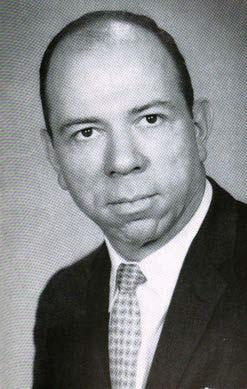
joined the state supreme court and was once retained by voters in 1962 but lost re-election in 1966. After his service on the bench, Smith joined General Motors as vice president and general counsel until 1984 when he left to work at the David Lewis law firm (later renamed Lewis & Munday PC). In 1994, Smith passed away after battling cancer.
Dennis Archer
Associate Justice (1985-1990)
Conrad Mallett
Associate Justice (1990-1998)
Chief Justice (1998-1999)
Robert Young
Associate Justice (1999-2011)
Chief Justice (2011-2017)
Dennis Archer was appointed to the court in 1985 by Governor James Blanchard (D). Archer began his legal career in private practice and teaching at local law schools He remained there until his appointment to the supreme court and was elected to a full term in 1986. Archer resigned in 1990. He was later Mayor of Detroit and President of the American Bar Association. He most recently worked at Dickinson Wright as chairman emeritus
Conrad Mallett was the first Black chief justice of the Michigan Supreme Court Prior to his service on the bench, Mallett maintained a career of public service first working as the Director of Legislative Affairs for Governor James Blanchard (D) and later as the executive assistant to Detroit Mayor Coleman Young He joined the court in 1990 and was chief justice from 1998 to 1999 He currently serves as Detroit’s Corporation Counsel
Robert Young was appointed to the court in 1999 by Governor John Engler (R) to replace chief justice Mallett Young’s legal career started in private practice and remained there for 15 years before working as vice president, corporate secretary, and general counsel for AAA Michigan. He later served on the Michigan Civil Service Commission. Young first joined the bench in 1995 following his appointment to the Michigan Court of Appeals by Engler He remained on the court of appeals until his elevation to the supreme court Young was subsequently re-elected to the supreme court in 2000, 2002, and 2010 He served as chief justice from 2011 to 2017 and then retired from the court He currently works as an arbitrator and in mediation
Kurtis Wilder
Associate Justice (2017-2019)
Kurtis Wilder was appointed to the court by Governor Rick Snyder (R) in 2017 to fill the remainder of Chief Justice Young’s term He ran for a full term in 2018 and was defeated Prior to the bench, Wilder worked in private practice for twelve years He was first appointed to the bench in 1992 by Governor John Engler (R) to the Washtenaw County Circuit Court where he was the first Black judge on that court. Six years later, Wilder was elevated to the First District Court of Appeals by Engler and he remained there until his appointment to the supreme court After his electoral defeat, Wilder returned to private practice and currently is Shareholder at Butzel
Kyra Bolden
Associate Justice (2023-Present)
Kyra Harris Bolden is the first Black woman to join the Michigan Supreme Court In 2023, she was appointed to the court by Governor Gretchen Whitmer (D) to fill the vacancy left by Chief Justice Bridget Mary McCormack’s retirement She must run in a special election in 2024 to fill the remainder of the term. She began her legal career as a defense attorney and later as a clerk before returning to private practice. In 2019, Bolden was elected to serve as a member of the Michigan House of Representatives.
Term ends: January 2025

Robert Morton Duncan
Associate Justice (1969-1971)
Robert Morton Duncan became the first Black justice to serve on the Ohio Supreme Court in 1969
Following graduation from the University’s Mortiz College of Law, Duncan briefly served in the Army After his service in the military, Duncan began working as an assistant attorney general and later an attorney with the Bureau of Workers’ Compensation’s Industrial Commission Duncan then worked as the city attorney for Columbus then returned to the Attorney General’s office. In 1966, he won election to the Franklin County Municipal Court where he remained until Governor James Rhodes (R) appointed him to the Ohio Supreme Court in 1969. He was re-elected to the bench a year later but left in 1971 following his appointment to the U.S. Court of Military Appeals by President
19691971

was the first Black judge to serve on that court. Nixon appointed Duncan to the U.S. District Court for Southern Ohio. Duncan left the bench in 1985 to work for Jones, Day, Reavis and Pogue. Duncan passed away in 2012.
Lloyd O. Brown
Associate Justice (1971-1972)
Yvette McGee Brown
Associate Justice (1998-1999)
Lloyd O Brown was elected to the Cleveland Municipal Court in 1967 and appointed to the Ohio Supreme Court in 1971 by Governor John Gilligan (D) to fill the vacancy created by Justice Duncan’s retirement He ran for re-election to a full six-year term in 1972 and was defeated Brown began his legal career in private practice before serving as assistant attorney general for Ohio and later as an attorney with the Cuyahoga County Prosecutor's Office He remained there until his election to the municipal court After his service on the supreme court, Gilligan appointed Brown as judge in Cuyahoga County Common Pleas Court in 1971. He served on that bench for 15 years before retiring and returning to private practice. He passed away in 1993.
Yvette McGee Brown was the first Black woman to join the Ohio Supreme Court She was previously a Court of Common Pleas judge in the domestic relations and juvenile division and co-founded a national organization to prevent child abuse and domestic violence. She was appointed to the Ohio Supreme Court by Governor Ted Strickland (D) in 1998 and was defeated in an election to fill the remainder of the term the following year She is currently partner at Jones Day
Melody Stewart
Associate Justice (2019-Present)
Melody Stewart was elected to the Ohio Supreme Court in 2018 after defeating incumbent justice Mary DeGenaro. She had previously served three terms on the Ohio District Court of Appeals is a graduate of the University of Cincinnati and the Cleveland-Marshall College of Law holds a PhD from Case Western Reserve University’s Mandel School of Applied Social Sciences She is the first Black woman to be elected to the Ohio Supreme Court
Term ends: January 2025
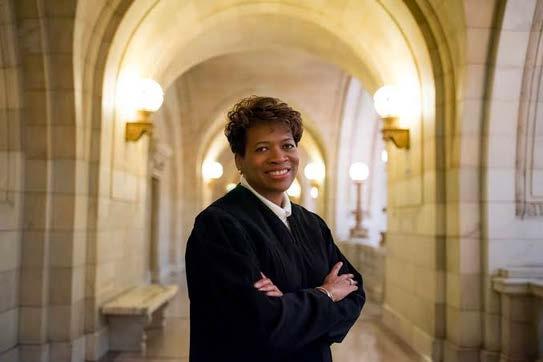
2019PRESENT
Robert Nix, Jr.
Associate Justice (1972-1984) | Chief Justice (1984-1996)
-
In 1972, Pennsylvanians elected Robert Nix Jr. as the supreme court’s first Black justice and first Black person to be elected to a statewide office. Nix served in the U.S. Army after graduating from law school. When he returned to Pennsylvania in 1956, Nix became deputy attorney general. He left two years later and went into private practice law firm at Nix, Rhodes & Nix where he litigated numerous civil rights cases Nix’s judicial service began when he was elected to the Philadelphia Court of Common Pleas in 1967 Then in 1972, he ran for associate justice on the Pennsylvania Supreme Court and won,
eventually becoming the chief justice in 1984 Nix was the first Black chief justice to serve on any state supreme court in the nation. He retired from the court in 1998
Juanita Kidd Stout
Associate Justice (1988-1989)
Cynthia Ackron Baldwin
Associate Justice (2006-2008)
Juanita Kidd Stout was the first Black woman to serve on the supreme court of any state Prior to her career on the bench, she worked in private practice and in the District Attorney’s office. She was the first Black woman to serve as a judge in the state of Pennsylvania when she was appointed to a municipal court judgeship in 1959 She won election to a full term that year and became the first Black woman elected to a judgeship in the United States She was later appointed to the Court of Common Pleas and was appointed to the Pennsylvania Supreme Court in 1988 by Governor Bob Casey (D). She retired the following year upon reaching the mandatory retirement age of 70 She died in 1998
Cynthia Ackron Baldwin was appointed to the Pennsylvania Supreme Court in 2006 by Governor Ed Rendell (D). She retired from the court in 2008 She had previously served as a judge of the Allegheny County Court of Common Pleas for 16 years Before she joined the court of common pleas, Baldwin worked at Office of the Attorney General at the Bureau of Consumer Protection Following her service on the supreme court, she became general counsel for the Pennsylvania State University

Harold A. Stevens
Associate Justice (1974-1975)
In 1974, Governor Malcolm Wilson (R) appointed Harold Stevens to the New York Court of Appeals, the state’s highest appellate court, making him the first Black court of appeals justice After law school, Stevens first practiced law in Boston for two years before moving to New York City While practicing law in New York, Stevens became an expert in labor law, even being appointed to the President’s Fair Employment Practices Committee. He then briefly served in World War II, and when he returned in 1946, he was elected to the New York State Senate. Stevens’ career is often regarded as a “string of firsts, ” beginning with his election to the New York Court of General
Session in 1950, making him the first
Black person to serve on that court It continued with his appointment by Governor Averill Harriman (D) in 1955 to the New York Supreme Court and was the first Black justice on the court In 1958, he became the first Black person to sit on the Appellate Division, First Department, then would go on to be the first Black presiding judge on that court In 1974, Stevens was appointed to fill a vacancy on the Court of Appeals by Wilson When he ran for election to a full term, he lost and returned to his previous position as presiding judge on the state supreme court He retired two years later
Fritz W. Alexander II
Associate Judge (1985-1992)
George Bundy Smith
Associate Judge (1992-2006)
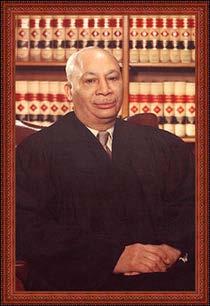
Theodore T. Jones
Associate Judge (2007-2012)
Fritz W Alexander II joined the court in 1985 following appointment by Governor Mario Cuomo (D) and was the first Black judge to serve a full term on the New York Court of Appeals He later served as a deputy mayor of New York City Alexander began his legal career in private practice He first joined the bench in 1970 after being appointed as a civil court judge Alexander retired from the court of appeals seven years into his term and returned to private practice. He died of cancer in 2000.
Governor Mario Cuomo (D) appointed George Bundy Smith to the the New York Court of Appeals in 1992 after Smith served on the Appellate Division, the New York State Supreme Court, and the New York City Civil Court He began his career at the NAACP Legal Defense and Educational Fund and was a Freedom Rider as a student at Yale Law School He then clerked for multiple judges before becoming administrator of model cities for New York City He retired from the bench in 2006 He passed away in 2017
After serving on the state supreme court, Theodore T. Jones was appointed to the court of appeals in 2007 by Governor Elliot Spitzer (D), where he led the Justice Task Force to reduce wrongful convictions until his death in 2012 He previously worked as attorney with the Legal Aid Society and in private practice before being elected to his judicial service He passed away in 2012
Smithauthoredthe opinioninPeoplev. LaValle(2004),a landmark4-3 decisioninwhich theNewYorkCourt ofAppealsheld thatthestate’s deathpenalty statutewas unconstitutional.
Sheila Abdus-Salaam
Associate Justice (2013-2017)
Sheila Abdus-Salaam was the first Black woman to join the court of appeals Abdus-Salaam began her legal career working for Brooklyn Legal Services, then as assistant attorney general, and later as general counsel for the New York City Office of Labor Services She was previously a judge of the New York City Civil Court after being elected in 1991 where she remained until her election to the state supreme court in 2007 In 2009, Governor David Paterson (D) appointed her to the state’s highest bench
Rowan D. Wilson
Associate Judge (2017-2023) | Chief Judge (2023-Present)
Rowan W Wilson is the first Black chief judge of the New York Court of Appeals He was first appointed to the court in 2017, by Governor Andrew Cuomo (D) and became chief judge in 2023 He worked in private practice before joining the court He is a graduate of Harvard College and Harvard Law School.
Term ends: December 2030
Shirley Troutman
Associate Judge (2022-Present)
Shirley Troutman was appointed to the New York Court of Appeals by Governor Kathy Hochul (D) in 2022 She was previously a judge of the Appellate Division, the New York State Supreme Court, the Erie County Court, and the Buffalo City Court She was also an assistant U S attorney and an assistant attorney general for the state of New York She graduated from SUNY Buffalo and Albany Law School.
Term ends: January 2026


Joseph W. Hatchett
Associate Justice (1975-1979)
In 1975, Joseph Hatchett became the first Black justice to serve on the Florida Supreme Court Hatchett started his legal career in private practice in Daytona Beach before becoming a cooperating attorney for the NAACP Legal Defense and Educational Fund He then worked for the U S Attorney’s Office for the Middle District of Florida, becoming the first Black assistant U S attorney to hold that position He left that position in 1971 when he was appointed to be a federal magistrate judge for the Middle District of Florida In 1975, Governor Reubin Askew (D) appointed Hatchett to the Florida Supreme Court, making him the first Black justice appointed in the South since South Carolina Supreme
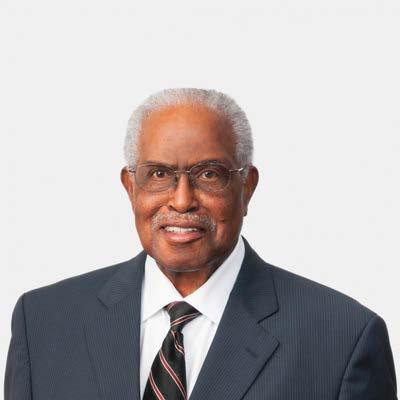
Court Justice White’s appointment in 1870, nearly 100 years earlier. He was re-elected to the position in 1976, making him the first Black person in the state to win a statewide election. Hatchett then became the first Black person to serve on the U.S. Court of Appeals for the Fifth Circuit when he was appointed in 1979 by President Jimmy Carter (D). When the circuit was split, Hatchett then served as judge on the new Eleventh Circuit Court of Appeals, eventually becoming the chief judge. He retired in 1999 and went into private practice focusing on appellate litigation
Leander J. Shaw, Jr.
Associate Justice (1983-1990; 1992-2003)
Chief Justice (1990-1992)
Leander J Shaw, Jr was the first Black chief justice of the Florida Supreme Court He began his legal career in private practice while also working as a public defender He then worked for the state attorney before returning to private practice in 1971 He remained there until his appointment by Governor Reubin Askew (D) to the Florida Industrial Relations Commission Shaw first joined the bench in 1979 following his appointment by Governor Bob Graham (D) to the First District Court of Appeal, where he remained until his election to the supreme court in 1983. He died in 2015.
Peggy A. Quince
Associate Justice (1999-2008; 2010-2019)
Chief Justice (2008-2010)
James E. C. Perry
Associate Judge (2009-2016)
Peggy A Quince was the first Black woman to serve as chief justice of the Florida Supreme Court Quince began her legal career in Washington, DC in housing law She then opened her own private practice in Norfolk, VA before moving to Florida in 1978 to practice civil law. She later joined the Attorney General’s Office Quince’s judicial service began with her appointment to the Second District Court of Appeal by Governor Lawton Chiles (D). She remained there until her appointment to the Florida Supreme Court in 1998 by Chiles and Governor-elect Jeb Bush (R). She retired from the bench in 2019
James E C Perry was appointed to the Florida Supreme Court in 2009 by Governor Charlie Crist (D). He was previously a judge of the Florida Judicial Circuit Court He retired from the court in 2017 upon reaching the mandatory retirement age of 70
Renatha Francis
Associate Justice (2022-Present)
Justice Renatha Francis was appointed to the Florida Supreme Court in 2022 by Governor Ron DeSantis (R). She was previously a judge of the Judicial Circuit Court and the Miami-Dade County Court She began her legal career in private practice and remained there until her appointment to the Miami-Dade County Court She was born and raised in Jamaica and is a graduate of the University of the West Indies and Florida Coastal School of Law. To remain on the bench, Francis must stand for retention election in November 2024.
Term ends: January 2025

George Howard, Jr.
Associate Justice (1977-1978)
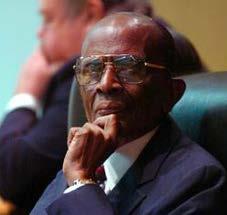
George Howard, Jr. became the first Black justice to serve on the Arkansas Supreme Court in 1977, following his appointment by Governor David Pryor (D). Howard’s legal career had numerous firsts, starting with his education. Howard was one of the first Black students to attend the University of Arkansas in Fayetteville and part of the “Six Pioneers” to desegregate the school. Howard practiced law in his hometown following graduation, litigating numerous civil rights cases Due to his career dedicated to civil rights, Governor Winthrop Rockefeller (R) appointed him to the Arkansas State Claims Commission, becoming its first Black member In 1977, Howard was appointed to the Arkansas Supreme
Court by Pryor, becoming the first Black justice In 1979, he left the court when he was appointed by Governor Bill Clinton (D) to the new Arkansas Court of Appeals, another historic first in his career In 1980, President Jimmy Carter (D) nominated him to serve as a federal district court judge for both the Eastern and Western District Courts, becoming the first Black federal judge to serve in the state He remained in that position until his death
Howardwrotethe opinioninSanders v.State(1977), upholdingasearch warrant requirementfor personalproperty seizedbypolice duringan automobilesearch. Whilethelawin thisareaultimately shifted,his reasoningwasfirst affirmedbythe UnitedStates SupremeCourtin Arkansasv. Sanders(1979).
Richard Mays
Associate Judge (1979-1980)
P.A. Hollingsworth
Associate Judge (1984)
Andree Layton Roaf
Associate Judge (1995-1996)
Richard Mays was appointed to the Arkansas Supreme Court in 1980 by Governor Bill Clinton (D) to fill a vacated term. He was previously a member of the Arkansas House of Representatives, and also worked at the U.S. Justice Department and as a prosecutor and private practitioner
PA Hollingsworth was appointed by Governor Bill Clinton (D) to the Arkansas Supreme Court to fill a vacated term He was previously elected to the Little Rock Board of Directors He began his legal career at Arkansas’ first integrated law firm but soon left to join Governor Winthrop Rockefeller’s (R) administration Hollingsworth then served as a deputy prosecutor He passed away in 2007
Appointed by Governor Jim Guy Tucker (D) to fill a vacated term, Andree Leyton Roaf was the first and only Black woman to serve as a justice of the Arkansas Supreme Court After completing the partial term, she was a judge on the Arkansas Court of Appeals until 2006 She then oversaw the federal desegregation of Little Rock as director of the federal Office of Desegregation Monitoring She died in July 2009
Lavenski Smith was appointed to the Arkansas Supreme Court by Governor Mike Huckabee (R) in 1999 He began his legal career in private practice before working for Ozark Legal Services He later returned to private practice until working under Huckabee’s Public Service Commission Smith briefly served on the state supreme court and then returned to the Public Service Commission as a commissioner. He was nominated to the U.S. Court of Appeals for the Eighth Circuit by President George W Bush (R) in 2001 He became chief judge in 2017
There have been no Black justices on the Arkansas Supreme Court since Justice Sheffield.
Wiley C. Manuel
Associate Justice (1977-1981)
By appointment from Governor Jerry Brown (D) in 1977, Wiley Manuel was California’s first Black justice to serve on the state supreme court Manuel started his legal career in the California Attorney General’s Office and remained there for over 20 years, holding multiple positions and eventually becoming the chief assistant attorney general In 1976, Brown appointed him to the Alameda County Superior Court, and one year later he was elevated to the California Supreme Court. In 1978, he was elected to a full 12-year term, but he passed away before he could finish the full term.
Allen Broussard
Associate Justice (1981-1991)
Janice Rogers Brown
Associate Justice (1996-2005)
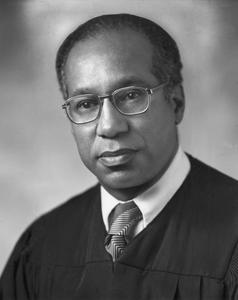
Allen Broussard was appointed to the California Supreme Court by Governor Jerry Brown (D). After graduating from law school, he served in the Army and then worked for the presiding judge on the California Court of Appeal First District before entering into private practice Previously a judge on the Municipal Court for the Oakland-Piedmont Judicial District, he also served as a judge and later presiding judge of the Alameda County Superior Court After retiring from the bench, he served on the Oakland Port Commission. He died in 1996.
Janice Rogers Brown was the first Black woman to join the California Supreme Court; she was appointed by Governor Pete Wilson (R). She left the court upon being confirmed to the U S Court of Appeals for the D C Circuit, where she was appointed by President George W Bush (R). She retired in 2017 Prior to her service on the bench, Brown dedicated her career to public service, first working for the California Legislative Counsel, then as the deputy attorney general, and later as deputy secretary and general counsel. She briefly worked in private practice before returning to work under Wilson until her appointment to the supreme court
Leondra R. Kruger
Associate Justice (2015-Present)
Leondra R. Kruger was appointed to the California Supreme Court by Governor Jerry Brown (D). Prior to joining the court, she was deputy assistant attorney general for the Office of Legal Counsel and the acting principal deputy solicitor general under the administration of President Barack Obama (D). She is a graduate of Harvard College and Yale Law School She will stand for retention election in 2030 to remain on the bench
Term ends: January 2031
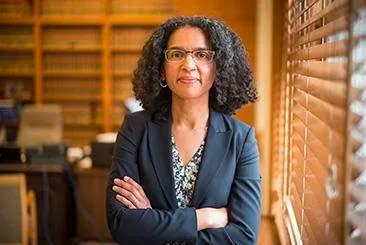
KrugerauthoredtheopinioninNationalLawyersGuildv.CityofHayward(2020),adecisioninwhich theCaliforniaSupremeCourtheldthatrequestorsundertheCaliforniaPublicRecordsActwouldnot bearthecostsofredactingelectronicrecords,withsignificantimplicationsformakingpoliceoffer bodycamerafootagemoreaccessibletothepublic.
Martin Jenkins
Associate Justice (2020-Present)
Martin Jenkins was appointed to the California Supreme Court by Governor Gavin Newsom (D). Before joining the supreme court, Jenkins advised Newsom on judicial appointments He was previously a judge of the California Court of Appeal and the US District Court for the Norther District of California He is a graduate of Santa Clara University and the University of San Francisco School of Law Jenkins began his legal career as a prosecutor before working for the US Department of Justice and as a private practitioner. Jenkins must be retained by voters in 2034 to remain on the bench.
Current term ends: January 2035
Kelli Evans
Associate Justice (2022-Present)
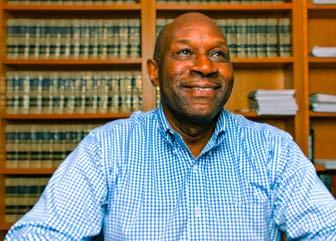
Kelli Evans was appointed to the court in 2022 by Governor Gavin Newsom (D). She was previously a judge of the Alameda County Superior Court. Evans also worked in the Civil Rights Division of the U.S. Department of Justice, as director of the ACLU of Norther California, and in the Sacramento County Public Defender’s Office Before joining the superior court, she worked as chief deputy legal affairs secretary to Newsom as well as special assistant to the attorney general Evans must be retained by voters in 2026 to remain on the bench
Term ends: January 2027

Harry A. Cole
Associate Judge (1977-1991)
Harry A. Cole was the first Black justice to serve on the Maryland Supreme Court following his appointment in 1977 by Governor Blair Lee III (D). Cole started his legal career working with the Baltimore NAACP and later became the first Black assistant state attorney general in Maryland in 1953 The following year, Cole was elected to the Maryland State Senate However, he lost his seat in 1958 Cole went into private practice and attempted to run for Baltimore City Council but was unsuccessful Then in 1967, Governor Spiro Agnew (D) appointed him to serve as associate judge for
19771991
the Municipal Court of
Baltimore City He was elevated later that year to the Supreme Bench of Baltimore City, which is now the Circuit Court He was then appointed by Lee to Maryland Court of Appeals in 1977, the state’s highest appellate court now called the Maryland Supreme Court. He remained there until his retirement in 1991. He passed away in 1999.
Robert M. Bell
Associate Judge (1991-1996)
Chief Judge (1996-2013)
Clayton Greene, Jr.
Associate Judge (2004-2019)
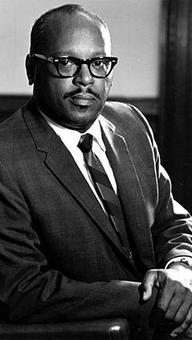
Robert M. Bell was the first Black chief justice of the Maryland Court of Appeals. He was previously a judge of the Maryland Court of Special Appeals, the Circuit Court for Baltimore City, and the Maryland District Court for Baltimore City He was the lead plaintiff in Bell v Maryland, in which the U S Supreme Court ordered the Maryland Court of Appeals to reconsider the convictions of 12 Black students, including Bell, of trespassing charges stemming from their participation in a sit-in protest in a Baltimore restaurant in 1960 He was appointed to the court by Governor William Donald Schaefer (D).
Clayton Greene, Jr was appointed to the Maryland Court of Appeals by Governor Robert Ehrlich (R) in 2004 He was previously a circuit court judge and an administrative judge for district courts Prior to joining the bench, he worked as an assistant public defender.
In 2022, Maryland voters approved a constitutional amendment to change the title of the state’s court of last resort to the Supreme Court of Maryland, and the titles of its judges to “justice.”
Shirley M. Watts
Associate Justice (2013-Present)
Shirley M Watts is the first Black woman to join the Maryland Supreme Court She was appointed to the court by Governor Martin O’Malley (D). She was previously a judge of the Maryland Court of Special Appeals and the Circuit Court for Baltimore County Before joining the bench, she served as an assistant state’s attorney and a federal public defender She is a graduate of Howard University and Rutgers University School of Law Watts must be retained by voters to continue serving on the bench
Term ends: December 2024
2013PRESENT

THE
Michele D. Hotten
Associate Justice (2015-Present)
Michele D Hotten was appointed to the court in 2015 by Governor Larry Hogan (R). She previously served as a judge of the Maryland Court of Special Appeals and a Prince George’s County Circuit Court and District Court judge She also worked as an assistant state’s attorney She graduated from New College at the University of South Florida and Howard University School of Law Hotten must be retained by voters to continue serving on the bench
Term ends: December 2026
Angela M. Eaves
Associate Justice (2022-Present)
Angela M Eaves joined the Maryland Supreme Court after being appointed by Governor Larry Hogan (R). She was previously an administrative judge and an associate judge for the Harford County Circuit Court and a judge of the Maryland District Court for Harford County She also worked as a staff attorney for the Maryland Legal Aid Bureau She attended the University of Texas, earning bachelor’s and master’s degrees, and the University of Texas School of Law. Eaves must be retained by voters this year to continue serving on the bench.
2015 -

2022PRESENT

Oscar W. Adams, Jr.
Associate Justice (1980)
Governor Fob James (R) appointed Oscar Adams Jr. in 1980 to serve on the Alabama Supreme Court, making Adams the first Black justice to serve on the state’s highest bench. Adams began his career at his own private practice law firm specializing in civil rights litigation. One year after becoming the first Black attorney to be admitted to the Birmingham Bar Association, Adams partnered with Harvey Bug, a white attorney, to create the state’s first integrated law practice Then two years later, Adams founded Birmingham’s first Black law firm with James Baker Then in 1980, he was nominated to the state supreme court Two years later, Adams became the first Black candidate to be elected to a statewide constitutional office in Alabama He retired from the bench in 1993 He passed away four years later
Ralph Cook
Associate Justice (1993-2001)
John H. England
Associate Justice (1999-2001)
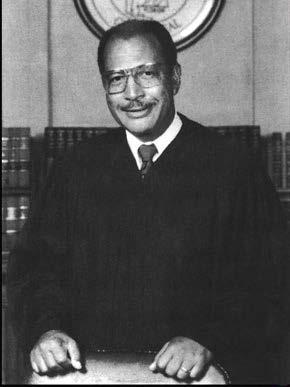
Ralph Cook was appointed to the Alabama Supreme Court by Governor Jim Folsom (D). Running as a Democrat, he won election to a full term in 1994 but was defeated by a Republican challenger in 2000 He was previously a circuit court and district court judge He also worked as a deputy district attorney and a law school professor and dean He graduated from Tennessee State University and Howard University School of Law. Cook is currently at trial lawyer at Hare, Wynn, Newell & Newton.
John England, Jr. joined the Alabama Supreme Court after being appointed by Governor Jim Folsom (D). He ran for a full term on the court in 2000 and was defeated Prior to his appointment, he was a judge of the Circuit Court of Tuscaloosa County and had previously served on the Tuscaloosa City Council After his time on the supreme court, he returned to his seat on the circuit court, where he served until 2021 He currently serves on the Board of Trustees for the University of Alabama Systems
There have been no Black justices on the Alabama
Supreme Court since Justice England.
George H. Brown, Jr.
Associate Justice (1980)
George Brown Jr. was the first Black justice to serve on the Tennessee Supreme Court following his appointment by Governor Lamar Alexander (R) in 1980 Brown began his legal career in private practice in Memphis before working for the Federal Equal Employment Opportunity Commission in 1968 He later worked as a conciliator in Memphis and then as the first director for the Legal Services Association in Shelby County In 1975, he opened his own private practice firm with Walter Evans and remained there until his election to the Memphis Board of Education, serving there for 13 years Brown was appointed to the state supreme court by Alexander, having served as campaign co-chair for Alexander’s gubernatorial campaign. However, in 1980, Brown lost re-election to the court and returned to private practice. Alexander appointed him to the Circuit Court for the Thirtieth Judicial District of Memphis and served on that bench until 2005.
A. A. Birch, Jr.
Associate Justice (1990-1994; 1996-1997; 1998-1999; 2001-2006)
Chief Justice (1994-1996; 1997-1998; 1991-2001)
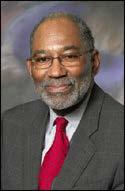
A A Birch, Jr was the first Black chief justice of the Tennessee Supreme Court He was first appointed to the court by Governor Ned Ray McWherter (D) in 1990 and elected to a second term in 1998. He was selected as chief justice by his peers in 1994, 1996, 1997, and 1999, and retired from the court in 2006. Prior to joining the supreme court, he was a judge at every level of the Tennessee courts system, serving first as a judge of the Davidson County General Sessions Court He was then appointed to the Davidson County Criminal Court, and later served as presiding judge of the Davidson County Trial Courts He then served on the Court of the Judiciary, which oversees judicial conduct, before being appointed to the Tennessee Court of Appeals Before joining the bench, he was an assistant district attorney and an assistant public defender, and also operated a private law practice through which he provided pro bono legal representation to civil rights activists. He died in 2011.
Henry Frye
Associate Justice (1983-1999) | Chief Justice (1999-2001)
Henry Frye was the first Black justice and chief justice to serve on the North Carolina Supreme Court. Frye began his legal career in private practice but left in 1963 to serve as assistant U.S. attorney for the Middle District of North Carolina. In joining the U.S. attorney’s office, Frye became the first Black assistant U S attorney in the United States Five years later, Frye became the only Black legislator to serve in the North Carolina General Assembly and the first elected in the 20th century He served six terms in the General Assembly and then one term in the state Senate Throughout this period of time in his
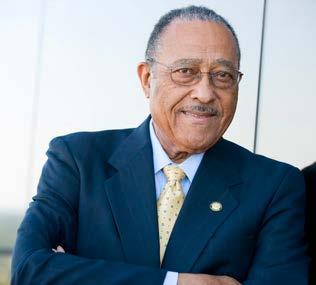
career, Frye continued his private practice In 1983, Frye was appointed by Governor James “Jim” Hunt (D) to serve on the state supreme court and eventually appointed again to serve as the court’s chief justice. Frye was subsequently twice re-elected to the position until losing in 2000. Frye returned to private practice in Greensboro, NC.
James Andrew Wynn, Jr.
Associate Justice (1998)
G.K. Butterfield
Associate Justice (2001-2002)
James Andrew Wynn, Jr was appointed to the North Carolina Supreme Court by Governor Jim Hunt (D) to fill a vacated term Following his time on the supreme court, he served on the North Carolina Court of Appeals from 1999 to 2010, when he was nominated to the U S Court of Appeals for the Fourth Circuit by President Barack Obama (D), where he continues to serve today. Before serving on the North Carolina Supreme Court, he worked in private practice and as an assistant appellate defender for the state of North Carolina He also served the U S Navy’s Judge Advocate General Corps and later served as a military judge as part of his service in the U S Naval Reserve
G K Butterfield was appointed to the North Carolina Supreme Court by Governor Mike Easley (D). He ran for reelection to the court in 2002 and was defeated Prior to joining the supreme court, he was a judge of the North Carolina Superior Court for eleven years, and worked as a civil rights attorney, winning several voting rights cases After his time on the supreme court, he was elected to the U S House of Representatives, where he served from 2004 to 2022, including as senior chief deputy whip for the Democratic Caucus. He retired from Congress in 2022.
Patricia Timmons-Goodson
Associate Justice (2006-2012)
Cheri Beasley
Associate Justice (2012-2019)
Chief Justice (2019-2020)
Patricia Timmons-Goodson was the first Black woman to join the North Carolina Supreme Court. She was appointed to the court by Governor Jim Hunt (D) in 2006 and ran for a full term in 2008. She was previously a judge of the North Carolina Court of Appeals and the Cumberland County District Court Prior to joining the bench, she was an assistant district attorney and worked as a district manager for the U S Census Bureau’s Charlotte Regional Office and as a staff attorney for Lumbee River Legal Services She retired from the supreme court in 2012 She currently serves as the dean of North Carolina Central University School of Law
Cheri Beasley was the first Black woman to serve as chief justice of the North Carolina Supreme Court She was first appointed to the court in 2012 by Governor Beverly Perdue (D) to fill the remainder of the term vacated by Justice Timmons-Goodson She was elevated to chief justice of the court in 2019 by the appointment of Governor Roy Cooper (D). She ran for a full term as chief justice in 2020 and was defeated by 401 votes. Prior to joining the court, she was a judge of the North Carolina Court of Appeals and the Cumberland County District Court Prior to joining the bench, she was an assistant public defender in Cumberland County She is currently a shareholder at Haynsworth Sinkler Boyd, P A
Michael R. Morgan
Associate Justice (2017-2023)
Michael R Morgan was elected to the North Carolina Supreme Court in 2016 and assumed office in 2017 Before joining the court, he was a judge of the North Carolina Superior Court, the Wake County District Court, and the North Carolina Office of Administrative Hearings He worked in the North Carolina Department of Justice for 10 years prior to joining the bench. He resigned from the supreme court in 2023 and announced he would run for Governor of North Carolina in 2024
Anita Earls
Associate Justice (2019-Present)
Anita Earls was elected to the North Carolina Supreme Court in 2018 Prior to joining the court, she litigated civil rights cases before serving as the U.S. Department of Justice deputy assistant attorney general in the Civil Rights Division. She then served as director of the Voting Rights Project at the Lawyers’ Committee for Civil Rights, director of advocacy at the University of North Carolina Center for Civil Rights, and as the founding executive director of the Southern Coalition for Social Justice. Earls must be re-elected in 2026 to remain on the bench
Term ends: December 2026

EarlsdraftedthemajorityopinioninHolmesv.Moore(2022),a4-3rulinginwhichtheNorthCarolina SupremeCourtstruckdownaraciallydiscriminatoryvoterphotoIDlaw.Thecourtproceededto rehearthecaseandreverseitsdecisionmonthslateroncethecompositionofthecourtchanged followingthe2022election.
Charles Thomas
Associate Justice (1983-1989)
Charles Thomas was the first Black justice to serve on the Supreme Court of Virginia After graduating law school, Thomas went in to private practice and was the first Black attorney to work at his firm In 1982, he became the first Black partner at a major law firm in the South In 1983, he was appointed by Governor Chuck Robb (D) to serve on the Supreme Court of Virginia, and at 32, he was the youngest person to sit on a court in the country However, his judicial service did not end with the supreme court. He had to retire after serving seven years on the bench and returned to private practice. In 2005, he was appointed to serve on the international Court of Arbitration for Sport.
Leroy R. Hassell
Associate Justice (1989-2003)
Chief Justice (2003-2011)
-
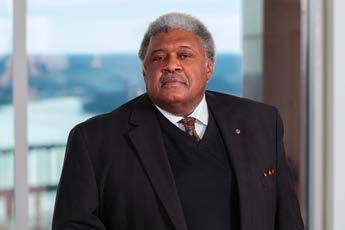
Leroy R Hassell was the first Black chief justice of the Virginia Supreme Court He was appointed to the court by Governor Gerald Baliles (D) in 1989. He became chief justice in 2003 by vote of his peers. As chief justice, he advocated for access to justice, an independent judiciary, and reforms to Virginia’s mental health laws Prior to joining the court, he worked in private practice He died in office in 2011
S. Bernard Goodwyn
Associate Justice (2007-2022) | Chief Justice (2022-Present)
Appointed by Governor Tim Kaine (D) in 2007, S Bernard Goodwyn is the current chief justice of the Virginia Supreme Court Confirmed to two subsequent 12-year terms by the Virginia General Assembly in 2008 and 2020, he became chief justice in 2022 Prior to joining the bench, he was a district and circuit court judge, and worked in private practice and as an assistant law professor at the University of Virginia School of Law He is a graduate of Harvard University and the University of Virginia School of Law He must be re-elected by the legislature to remain on the bench
Term ends: January 2032
Cleo Powell
Associate Justice (2011-Present)
Cleo Powell is the first Black woman to join the Virginia Supreme Court She was elected court by the Virginia General Assembly for a full term in 2011 and confirmed to a second term in 2023. Prior to joining the supreme court, she was a judge at every level of Virginia’s court system serving as a district court, circuit court, and court of appeals judge. She worked as assistant attorney general of Virginia and worked as counsel and later director of employee services for a utility corporation. She graduated from the University of Virginia and the University of Virginia School of Law Powell must be re-elected by the legislature to remain on the bench
Term ends: January 2035
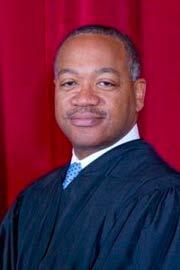
2011PRESENT

Reuben V. Anderson
Associate Justice (1985-1991)
Reuben Anderson was the first Black justice to serve on the Mississippi Supreme Court. After being the first Black student to graduate from the University of Mississippi Law School, Anderson worked for the NAACP Legal Defense Fund, litigating civil rights cases After nearly a decade, he joined a private practice firm and was later appointed as a judge on the Jackson Municipal Court He was then appointed to the Hinds County Court and remained there for four years until joining the circuit court In 1982, Anderson joined the 7th Circuit Three years later, he was appointed to the supreme court by Governor William Allain (D) and served on the bench until his retirement in 1991 Anderson returned to private practice focusing on commercial litigation and governmental and regulatory matters He also was the first Black president of the Alabama Bar Association He is currently of counsel at Phelps Dunbar LLP.

Associate Justice (1991-2001)
Fred L. Banks, Jr. was appointed to the Mississippi Supreme Court by Governor William Allain (D) in 1991 and was re-elected in 1991 and 2006. Prior to joining the court, he was a circuit court judge and served three terms in the Mississippi House of Representatives Before his election to the Mississippi House, he worked in private practice as a local counsel for the NAACP Legal Defense and Educational Fund; his stated intention for joining the practice of law was “to help Black people achieve equality.” He retired from the Mississippi Supreme Court in 2001 and returned to private practice He is currently of counsel at Phelps Dunbar LLP
James E. Graves, Jr.
Associate Justice (2011)
Leslie D. King
Associate Justice (2011-Present)
Justice Leslie D King was appointed to the Mississippi Supreme Court by Governor Haley Barbour (R) in 2011 He was previously a court of appeals judge and a municipal court judge Before joining the bench, he was elected to the Mississippi House of Representatives and worked as a prosecutor, a public defender, and in private practice. He graduated from the University of Mississippi and Texas Southern University School of Law. King must be re-elected by voters to continue his service on the bench.
Term ends: December 2028
2011PRESENT
ALLIANCE FOR JUSTICE

Robert D. Glass
Associate Justice (1987-1992)
Following his appointment to the Connecticut Supreme Court in 1987 by Governor William O’Neill (D), Robert Glass became the first Black justice on the state’s highest bench When Glass first applied to law school at the University of North Carolina School of Law, he was denied because of his race. In a landmark case litigated by Thurgood Marshall, Glass and Harold Epps filed suit against the university and won. While the litigation was pending in court, Glass had instead attended North Carolina Central University School of Law. Glass was the first Black person admitted to the
19871992
North Carolina bar, but later Glass
moved to Connecticut where he was one of the first Black attorneys in the state He then went on to serve as assistant U S attorney in the state until 1967 when he became Connecticut’s first Black juvenile court judge He served on the juvenile court bench until his appointment to the superior court by Governor John Dempsey (D). He remained there until his appointment to the state supreme court He retired from the bench in 1992 after reaching the mandatory retirement age
Flemming L. Norcott, Jr.
Associate Justice (1992-2013)
Lubbie Harper, Jr.
Associate Justice (2011-2012)

Flemming L Norcott, Jr was appointed to the Connecticut Supreme Court in 1992 by Governor Lowell Weicker (Connecticut Party, I). He was previously a judge of the Connecticut Appellate Court and the Connecticut Superior Court Before becoming a judge, he was a hearing examiner for the Commission on Human Rights and Opportunities and a founding executive director for the New Haven Center for Advocacy, Research and Planning He was also assistant attorney general in the United States Virgin Islands and was a volunteer in the U S Peace Corps After retiring from the supreme court in 2013, he became a lecturer at Hopper College at Yale University
Lubbie Harper, Jr was nominated to the Connecticut Supreme Court by Governor Dannel Malloy (D) in 2011, though he was only one year away from the state’s mandatory retirement age of 70 Harper had previously stood in for a recused justice of the supreme court in 2008 and had served on the Connecticut Appellate Court and the Connecticut Superior Court before being elevated to the supreme court Prior to joining the bench, he worked in private practice and as counsel to the city of New Haven’s board of education. He retired from the supreme court in 2012 and has continued to sit by designation on the appellate court. He is the chair of the Connecticut Commission on Racial and Ethnic Disparity in the Criminal Justice System and represents the state of Connecticut on the National Consortium on Racial and Ethnic Fairness in the Courts
HarpercastthedecidingvoteinKerriganv.Commissionerof PublicHealth(2008),a4-3decisioninwhichtheConnecticut SupremeCourtlegalizedsame-sexmarriage.
Richard A. Robinson
Associate Justice (2013-2018) | Chief Justice (2018-Present)
Chief Justice Richard A. Robinson is the first Black chief justice of the Connecticut Supreme Court. He was appointed to the court in 2013 by Governor Dannel Malloy (D) and appointed chief justice by Malloy in 2018 Prior to joining the court, he served as a judge of the Connecticut Appellate Court and the Connecticut Superior Court He worked for the City of Stamford Law Department before joining the bench He is a graduate of the University of Connecticut and the West Virginia University College of Law Robinson must be re-nominated by the governor and re-confirmed by the state Senate to continue on the bench
Term ends: May 2026
Rahim L. Mullins
Associate Justice (2017-Present)
Justice Rahim L Mullins was appointed to the Connecticut Supreme Court by Governor Dannel Malloy (D) in 2017 He was previously a judge of the court of appeals and the Middlesex County Superior Court Before becoming a judge, he worked as an assistant attorney general in the Child Protection Division and as an assistant state’s attorney for the Appellate Bureau, Division of Criminal Justice He graduated from Clark University and the Northeastern University School of Law Mullins must be re-nominated by the governor and re-confirmed by the state Senate to continue on the bench.
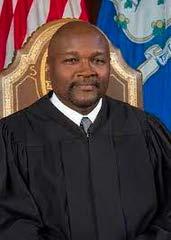
PRESENT
2017 -

Charles Z. Smith
Associate Justice (1988-2002)
In 1988, Charles Smith became the first Black justice to serve on the Washington Supreme Court following his appointment to the court by Governor Booth Gardner (D). Following his clerkship on the Washington Supreme Court, Smith worked a deputy prosecuting attorney for King County until serving as a special assistant to U S Attorney General Robert F Kennedy for the Teamsters Union pension fund investigation He left the Justice Department to work on Kennedy’s U S Senate campaign. He later returned to Washington in 1965 and was appointed as a judge on the Seattle Municipal Court, making him the
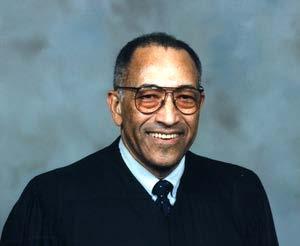
first Black judge to serve on that court In 1966, he was appointed by Governor Dan Evans (R) to the King County Superior Court, another first for the court, where he remained until becoming dean and a professor at the University of Washington School of Law in 1973 He retired a decade later Smith then served on the Washington Supreme Court after his appointment in 1988 by Garland He was re-elected to that bench three times and served on the U.S. Commission on International Religious Freedom after being appointed by President Bill Clinton (D). After reaching the state’s mandatory retirement age, Smith stepped down from the bench in 2002. He passed away in 2016.
Helen Whitener
Associate Justice (2022-Present)
Justice Helen Whitener is the first Black woman to join the Washington Supreme Court She was appointed to the court by Governor Jay Inslee (D) in 2020 and won re-election to a full term in 2022. She was previously a judge of the Pierce County Superior Court and the Board of Industrial Insurance Appeals. Before joining the bench, she worked as a public defender, a prosecutor, and as a private defense attorney She is a graduate of Baruch College and Seattle University Whitener must stand for re-election in 2028 to continue serving on the bench
Term ends: January 2029

Robert Benham
Associate Justice (1988-1995; 2001-2020) | Chief Justice (1995-2001)
Robert Benham was the first Black justice to serve as a justice on the Supreme Court of Georgia and the second Black student to graduate with a law degree from the University of Georgia Benham’s legal career began in 1970 practicing law in Cartersville, Georgia He first joined the bench in 1984 when he was elected as a judge to the statewide court of appeals, becoming the first Black person to sit as a judge on the court and first Black person to win a statewide election in Georgia since Reconstruction. He remained on that bench until 1989 when he was appointed by Governor Joe Frank Harris (D) to the Supreme Court of Georgia. Benham retired from the state’s highest bench in 2020.
Leah Ward Sears
Associate Justice (1992-2005)
Chief Justice (2005-2009)
Harold Melton
Associate Justice (2005-2018)
Chief Justice (2018-2021)

Leah Ward Sears was the first Black woman to join the Georgia Supreme Court She was first appointed to the court by Governor Zell Miller (D) in 1992 When she became the court’s chief justice in 2005, she was the first Black woman to become chief justice of a state supreme court She was previously a superior court and a City of Atlanta Traffic Court judge and worked in private practice and as an adjunct law professor before joining the bench She retired from the Georgia Supreme Court in 2009 and continues to work in private practice.
Harold Melton was appointed to the Georgia Supreme Court by Governor Sonny Perdue (R) in 2005 and became chief justice of the court in 2018 Prior to joining the Georgia Supreme Court, he was executive counsel to Perdue and worked as an assistant attorney general in the Georgia Department of Law. He retired from the supreme court in 2021 and now works in private practice
Verda Colvin
Associate Justice (2021-Present)
In 2021, Verda Colvin was appointed to the Georgia Supreme Court by Governor Brian Kemp (R) to fill the term vacated by Justice Melton’s retirement She was previously a judge of the Georgia Court of Appeals and the Macon Circuit Superior Court Prior to that, she was an assistant U S attorney for the Middle District of Georgia, Clayton County assistant district attorney, assistant general counsel to Clark Atlanta University, and assistant solicitor for Athens-Clarke County She graduated from Sweet Briar College and the University of Georgia School of Law She must be elected by voters to continue serving on the bench
Term ends: January 2029
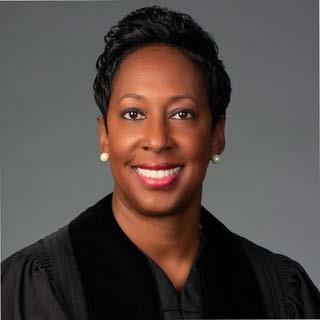
Charles E. Freeman
Associate Justice (1990-2018)
Charles Freeman became the first Black justice and chief justice on the Illinois Supreme Court when he was elected in 1990 Before Freeman’s career on the bench, he served as an assistant state’s attorney, an assistant attorney general, and an attorney for the board of elections He also worked in private practice Freeman was appointed by Governor Otto Kerner (D) in 1965 as an arbitrator for the Illinois Industrial Commission and remained there until being appointed as a Commerce Commission by Governor Dan Walker (D) in 1973. He left that position when he was elected to the Cook County Circuit Court in 1976. He went on to be elected in 1986 to the Illinois Appellate Court. Four years later, he was elected to the Illinois Supreme Court for the First Judicial District where he would eventually become the chief justice of the court. He served on the bench until 2001
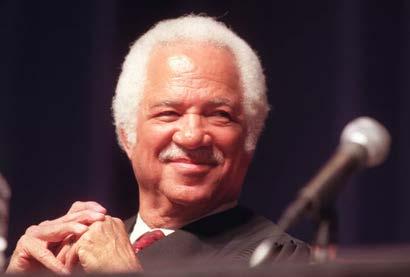
P. Scott Neville, Jr.
Associate Justice (2018-Present)
Justice P Scott Neville, Jr was appointed to the Illinois Supreme Court by the court to fill a vacancy created when Justice Freeman retired He represents the First Judicial District and was elected to a full term on the court in 2020. Before joining the supreme court, he was a judge of the First District Appellate Court and the Cook County Judicial Circuit Court. He worked in private practice before joining the bench. He is a graduate of Culver-Stockton College and Washington University School of Law. Neville must be re-elected by voters to continue serving on the bench.
Term ends: December 2030
Associate Justice (2022-Present)
Justice Lisa Holder White became the first Black woman to join the Illinois Supreme Court when the court appointed her to fill the vacancy left by Justice Rita Garman’s retirement Prior to joining the supreme court, where she represents the Fourth Judicial District, she was a Sixth Judicial Circuit Court judge and a Fourth District Appellate Court judge. She worked as an assistant state’s attorney, an assistant public defender, and in private practice before becoming a judge. She attended Lewis University and the University of Illinois College of Law. She must run for election to a full term on the court in 2024
Term ends: December 2024
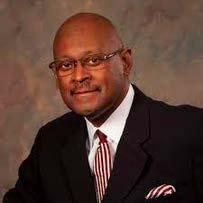
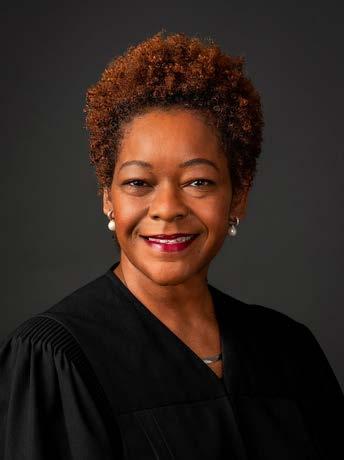
Joy Cunningham
Associate Justice (2022-Present)
Justice Joy Cunningham was appointed to the Illinois Supreme Court in 2022 to fill the vacancy created by the retirement of Justice Anne Burke. She represents the First Judicial District on the court. Prior to joining the supreme court, she was a judge of the First District Appellate Court and worked in hospital administration. She also worked as an Illinois assistant attorney general. She graduated from the City College of New York and John Marshall Law School She must run for election to a full term in 2024
Term ends: December 2024

Note: Texas is one of two states that has a court of last resort for criminal appeals and one for civil appeals (the Texas Supreme Court, detailed below at page 46).
Louis Sturns
Associate Judge (1990-1991)
Louis Sturns was the first Black person to serve on one of Texas’ highest courts. Sturns served on the statewide Texas Court of Criminal Appeals, the court of last resort for criminal matters. After law school, Sturns served as a judge advocate general (JAG) before entering private practice focusing on civil rights litigation. Sturns later became the first Black criminal district court judge in Tarrant County He left the district court bench in 1990 when he was appointed to the Texas Court of Criminal Appeals by Governor William Clements (R). He returned to private practice and later became a state district judge in the 213th District Court He retired in 2018
Morris L. Overstreet
Associate Judge (1990-1998)

Morris L Overstreet began his career as a prosecutor in Potter County and became the first Black first assistant district attorney in the county He left the district attorney’s office to work in private practice in 1981 and remained there until his election to the Potter County Court as presiding judge In 1990, Overstreet made history as the first Black person elected to statewide office with his election to the court of criminal appeals He retired from the Texas Court of Criminal Appeals in 1998 and has since worked in private practice, as a contract advisor to the National Football League, and as a law professor
Jesse F. McClure III
Associate Justice (2021-Present)
Judge Jesse F McClure III was appointed to the Texas Court of Criminal Appeals in 2021 by Governor Greg Abbott (R). He was elected to a full term in 2022 He was previously a trial court judge in Harris County Before joining the bench, he was a special prosecutor for the Texas Department of Insurance, a staff attorney at the US Department of Homeland Security, and an assistant district attorney in Tarrant County He graduated from the University of North Carolina at Chapel Hill and the University of Texas School of Law McClure must be re-elected to continue serving on the bench
Term ends: January 2029

Revius Oliver Ortique, Jr.
Associate Justice (1992-1994)
Revius Oliver Ortique, Jr was the first Black person appointed to the Louisiana Supreme Court in 1978 Ortique started his career in private practice, specializing in estate cases and often taking part in civil rights cases He was elected as president of the Urban League of Greater New Orleans in 1958 and would go on to serve five terms in that position Ortique first joined the bench in 1978 when the Louisiana Supreme Court appointed him to the Orleans Parish Civil District Court bench. He was subsequently elected to the court a year later, becoming the first Black person to do so. He later became the first Black chief judge of that court in 1984. Ortique was elected in 1992 to the Louisiana Supreme Court and retired two years later. He passed away in 2008.
Bernette Joshua Johnson
Associate Justice (1994-2013)
Chief Justice (2013-2020)
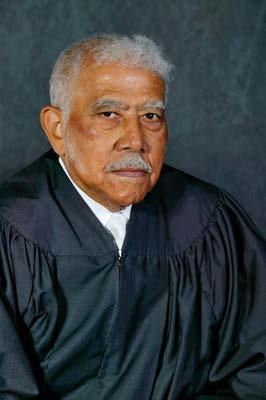
Bernette Joshua Johnson was the first Black woman to join the Louisiana Supreme Court She was appointed in 1994 by Governor Edwin Edwards (D) and elected in 2000 and 2010 She became chief justice in 2012 and was the first Black chief justice of the Louisiana Supreme Court Before she joined the court, she was a judge of the Orleans Parish Civil District Court Prior to joining the bench, she was the managing attorney of the New Orleans Legal Assistance Corporation She retired from the supreme court in 2020
Piper D. Griffin
Associate Justice (2021-Present)
Justice Piper D. Griffin was elected to the Louisiana Supreme Court in 2020. She previously served as chief judge of the Orleans Parish Civil District Court and worked in casualty litigation before joining the bench. She graduated from the University of Notre Dame and Louisiana State University’s Paul M. Hebert Law Center. She must be re-elected to her current position in 2030.
Term ends: December 2030

Gregory Kellam Scott
Associate Justice (1993-2000)
Gregory Kellam Scott was the first and only Black person to serve on the Colorado Supreme Court. Scott moved to Denver in 1977 when he started his legal career working for the Securities and Exchange Commission’s regional office as a trial attorney. Scott joined the high court in 1993 following an appointment from Governor Roy Romer (D). He served seven years before stepping down to join private company Kaiser-Hill LLC He died in 2021
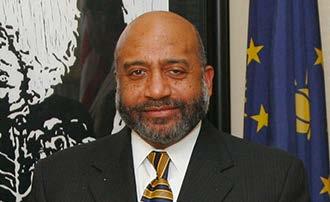
Alan Page
Associate Justice (1993-2015)
Alan Page was the first Black justice to serve on the Minnesota Supreme Court While playing in the National Football League, Page attended the law school at the University of Minnesota He began his legal career in private practice then served as special assistant attorney general beginning in 1985 and later as assistant attorney general beginning in 1987 In 1992, Page became the first Black person to serve on the state supreme court after winning in a statewide election and took office in 1993. He was re-elected to the court and continued to serve on the bench until reaching the mandatory retirement age in 2015.
Wilhelmina Wright
Associate Justice (2012-2016)
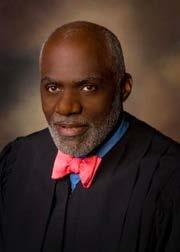
Wilhelmina Wright was the first Black woman to join the Minnesota Supreme Court She was appointed to the court by Governor Mark Dayton (D) and elected to a full term in 2014 Before joining the supreme court, she was a judge of the Minnesota Court of Appeals and the Ramsey County District Court. She was an assistant attorney for the U.S. District Court for the District of Minnesota and the U.S. Court of Appeals for the Eighth Circuit She was nominated to that district court by President Barack Obama (D) in 2016, where she served until February 2024
Natalie Hudson
Associate Justice (2015-2023) | Chief Justice (2023-Present)
Chief Justice Natalie Hudson is the first Black chief justice of the Minnesota Supreme Court She joined the court in 2015 after being nominated by Governor Mark Dayton (D). She was nominated to be the court’s next chief justice by Governor Tim Walz (D) in 2023 She previously served as a judge of the Minnesota Court of Appeals Before joining the bench, she worked in the Office of the Minnesota Attorney General and as assistant dean at Hamline University School of Law She graduated from Arizona State University and the University of Minnesota Law School She must run for election to a full term as chief justice in 2024.
Term ends: January 2024
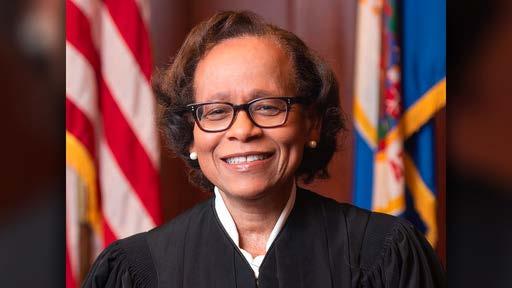
James Coleman, Jr.
Associate Justice (1994-2003)
James Coleman, Jr. became the first Black justice on the New Jersey Supreme Court in 1994 when he was nominated by Governor Christine Todd Whitman (Forward Party I). After serving in the military, Coleman began his legal career in private practice and later with the New Jersey Department of Labor and Industry Then in 1964, he was appointed as judge to the New Jersey Workers' Compensation Court and remained there until his appointment to Union County Court in 1973 Coleman was elevated as chief judge to New Jersey Appellate Court in 1987 and served there until his appointment to the supreme court He retired in 2003 after reaching the mandatory retirement age
John E. Wallace, Jr.

John E. Wallace Jr. was appointed to the New Jersey Supreme Court in 2003 by Governor James McGreevey (D) and confirmed by the New Jersey Senate. He was previously a judge of the New Jersey Superior Court and the Washington Township Municipal Court and worked in private practice before joining the bench When his term expired in 2010, Governor Chris Christie (R) declined to renominate him to the court He was the only Black justice on the court at the time and was the first justice to be denied tenure since the adoption of the state constitution in 1947
Fabiana Pierre-Louis
Associate Justice (2020-Present)
Justice Fabiana Pierre-Louis was nominated to the New Jersey Supreme Court by Governor Phil Murphy (D). She previously worked as a partner at Montgomery, McCracken, Walker & Rhoads and as an assistant US Attorney for the District of New Jersey She graduated from Rutgers Law School before clerking for New Jersey Supreme Court Associate Justice John E. Wallace, Jr. She must be re-nominated by the governor and re-confirmed by the state senate to continue in her current position.
Term ends: January 2027
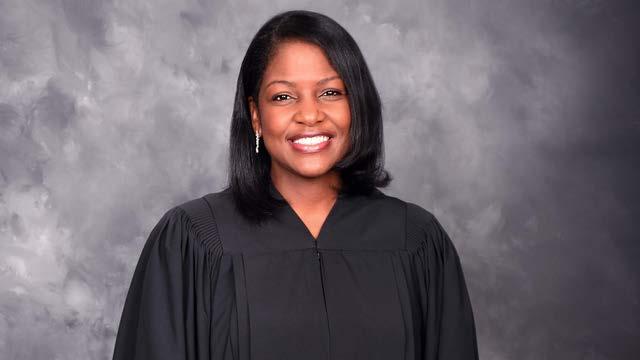
Franklin D. Cleckley
Associate Justice (1994-1996)
Franklin Cleckley was the first Black justice to sit on the West Virginia Supreme Court following his appointment by Governor Gaston Caperton (D) in 1994 Following law school, Cleckley served as a judge advocate general (JAG) officer with the US Navy for three years He then pursued additional graduate studies and later became the first Black person on staff at the West Virginia University in 1969 Then in 1972, Cleckley became the first Black person to be appointed as a full professor at the university. He later opened his own legal non-profit organization dedicated to assisting formerly incarcerated individuals with education and employment post-release. Cleckley joined the state’s highest bench in 1994 and stepped down two years later after choosing to not seek re-election. He returned to teaching after his service on the bench. He retired in 2013 and passed away four years later
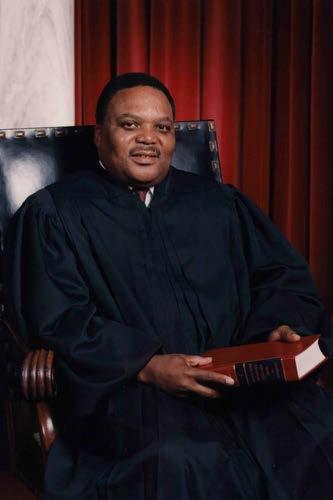
Myra C. Selby
Associate Justice (1995-1999)
Myra Selby was the first Black justice and first woman justice to serve on the Indiana Supreme Court Selby began her legal career in private practice in Washington, DC and in 1983 moved to Indianapolis, IN where she continued in private practice at Ice Miller Donadio & Ryan She later served as director of health care policy under Governor Evan Bayh (D). In 1995, she was appointed to the Indiana Supreme Court and served on the bench until 1999 when she returned to private practice. Selby is currently partner at Ice Miller Donadio & Ryan.
Robert Rucker
Associate Justice (1999-2017)
1995 -

Robert Rucker joined the Indiana Supreme Court in 1999 following his appointment by Governor Frank O’Bannon (D). Prior to his service on the bench, Rucker worked in private practice, and as deputy prosecuting attorney for Lake County, Indiana as well as city attorney for the City of Gary In 1991, Governor Evam Bayh (D) appointed Rucker to the Indiana Court of Appeals, making him the first Black judge to serve on the appellate court He retired in 2017 and since works as a senior judge on the Indiana Court of Appeals
There have been no Black justices on the Indiana Supreme
Ronnie L. White
Associate Justice (1995-2003, 2005-2007) Chief Justice (2003-2005)
Ronnie White was the first Black justice and first Black chief justice to serve on the Missouri Supreme Court White began his legal career as a public defender and then went into private practice for a year before going back to public defense at the Office of the Special Public Defender Beginning in 1989, White served in the Missouri General Assembly and remained there until returning to private practice in 1993 White left private practice when he was appointed as city counsel for St. Louis. In 1994, Governor Mel Carnahan (D) appointed him as judge on the Eastern District for the Missouri Court of Appeals. He served on that court until his appointment to the Missouri Supreme Court in 1995 by Carnahan. He later went onto serve as the court’s chief
-
justice. White retired from the bench in
2007 and returned to private practice. While serving on the supreme court, White was nominated by President Bill Clinton (D) to serve on the U.S. District Court for the Eastern District of Missouri, but White’s nomination failed. Then in 2013, President Barack Obama (D) nominated White again to the Eastern District of Missouri and he was confirmed to that court a year later. White still serves on the federal district court bench.
Robin Ransom
Associate Justice (2021-Present)
Judge Robin Ransom previously served as a judge on the Missouri Court of Appeals, Eastern District and as a circuit judge on the 22nd Judicial Circuit She graduated from University of MissouriColumbia School of Law before working as an assistant public defender and later an assistant prosecuting attorney in St Louis County Ransom was appointed to the court in 2021 by Governor Mike Parsons (R). Ransom must be retained by voters in 2034 to continue her service on the bench.
Term ends: December 2034


Roderick Ireland
Associate Justice (1997-2010) | Chief Justice (2010-2014)
Roderick Ireland was the first Black justice and first Black chief justice to serve on the Massachusetts Supreme Judicial Court. Ireland began his legal career dedicated to public service first as an attorney with Neighborhood Legal Services and later as a public defender, starting his own public defense program until his appointment in 1975 as assistant secretary and chief legal counsel for the Massachusetts Executive Office of Administration and Finance Then in 1977, he was appointed as chair of the Massachusetts Board of Appeals on Motor Vehicle Liability Policies and
-

Bonds Ireland’s judicial service
began in 1977 when he was appointed to the Boston Juvenile Court and remained there for 13 years until his appointment to the Massachusetts Appeals Court where he served for seven years In 1997, he was appointed to the Massachusetts Supreme Judicial Court by Governor William Weld (R), then in 2010 Governor Deval Patrick (D) appointed him as the court’s chief justice. Ireland retired from the court in 2014 and currently serves as the distinguished professor of criminology and criminal justice at Northeastern University.
Geraldine Hines
Associate Justice (2014-2017)
Geraldine Hines was the first Black woman to serve on the Massachusetts Supreme Judicial Court. After law school, Hines worked at the Massachusetts Law Reform Institute litigating for the rights of prisoners and left to work as public defender She then litigated civil rights cases in private practice and as a cooperating attorney with the Lawyers Committee for Civil Rights and the ACLU of Massachusetts Hines’ service on the bench began in 2001 following her appointment by Governor Paul Cellucci (R) to the superior court In 2013, Governor Deval Patrick (D) appointed her to the appeals court and later that year to the supreme judicial court She retired in 2017 and currently serves as the Huber Distinguished Visiting Professor at Boston College Law School.
Kimberly S. Budd
Associate Justice (2016-2020) | Chief Justice (2020-Present)
Chief Justice Kimberly Budd first joined the Massachusetts Supreme Judicial Court in 2016 following her appointment by Governor Charlie Baker (R). She was then elevated to chief justice of the court in 2020 by Baker again Budd previously served as an assistant US attorney in the United States Attorney’s Office for the District of Massachusetts and a university attorney for Harvard University. She graduated from Harvard Law School before clerking for Chief Justice Joseph P. Warner of the Massachusetts Appeals Court. Budd will retire upon reaching the mandatory retirement age.
Term ends: October 2036
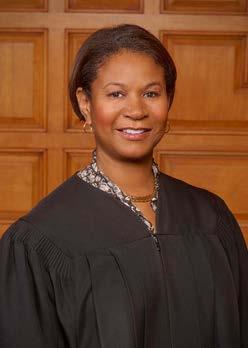
Serge Georges, Jr. Associate Justice (2020-Present)
Justice Serge Georges was appointed to the Massachusetts Supreme Judicial Court in 2020 by Governor Charlie Baker (R). He previously served as an associate justice of the Boston Municipal Court He graduated from Suffolk University Law School before working in private practice at Rackemann, Sawyer & Brewster, PC and Todd & Weld, LLP and later as partner at Barron & Stadfeld, PC Georges will retire upon reaching the mandatory retirement age
Term ends: Approximately 2040
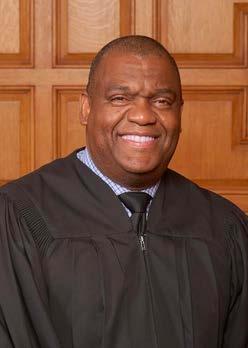
Note: Texas is one of two states that has a court of last resort for criminal appeals and one for civil appeals
Wallace B. Jefferson
Associate Justice (2001-2004)
Wallace Jefferson was the first Black person to serve on the Texas Supreme Court, the court of last resort for civil matters Jefferson began his career in private practice specializing in appellate litigation He would eventually open his own appellate litigation firm with Tom Crofts and Sharon Callaway Governor Rick Perry (R) appointed Jefferson to the Texas Supreme Court in 2001, making him the first Black justice to serve on that court Jefferson went on to be the first Black person to serve as chief justice of the court in 2004 He retired from the bench in 2013 and returned to private practice
Dale Wainwright
Associate Justice (2002-2012)
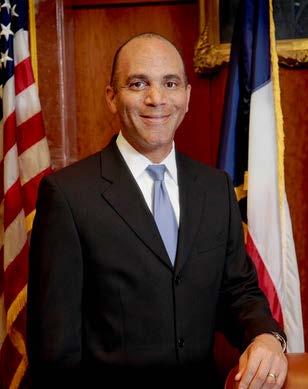
Wainwright began his legal career in private practice where he remained for over ten years before his appointment in 1999 to the 34th District Court bench in Harris County He served on that bench until 2002, when he ran for election to the Texas Supreme Court, becoming the first non-incumbent Black person to be elected to the state supreme court. He retired from the bench in 2012 and returned to private practice. He is currently co-chair of National Appeals & Legal Issues Practice at Greenberg Traurig, LLP.
Note: Oklahoma is one of two states that has a court of last resort for civil appeals and one for criminal appeals (the Oklahoma Court of Criminal Appeals, detailed below at page 51).
Tom Colbert
Associate Justice (2004-2013) | Chief Justice (2013-2021)
Tom Colbert was the first Black chief justice to serve on the Oklahoma Supreme Court Colbert began his legal career as an assistant dean of Marquette University Law School before leaving in 1984 to serve as an assistant district attorney in Oklahoma County. Two years later, Colbert went into private practice while also serving as an attorney with the Oklahoma Department of Human Services. Colbert joined the bench in 2000 following an appointment to the Oklahoma Court of Civil Appeals by Governor Frank Keating (R) and later became that court’s chief judge. In 2004, Governor Brad Henry (D) appointed Colbert to the state supreme court, and he became its chief justice over a decade later He retired from the court in 2021

There have been no Black justices on the Oklahoma Supreme Court
Louis B. Butler, Jr.
Associate Justice (2004-2008)
Louis B. Butler, Jr. was the first Black justice to serve on the Wisconsin Supreme Court. Butler started his legal career as a public defender. Then in 1992, he was appointed to the Milwaukee Municipal Court where he served for a decade until his election to the Milwaukee County Circuit Court In 2004, Governor Jim Doyle (D) appointed him to the Wisconsin Supreme Court, making history as the court’s first Black justice But in 2008, when he ran for election to a full term, he lost to Michael Gableman Following his service on the bench, Butler joined the faculty at University of Wisconsin Law School before going into private practice He was nominated to the federal bench by President Barack Obama (D) but was never confirmed Butler is currently an emeritus partner at DeWitt.
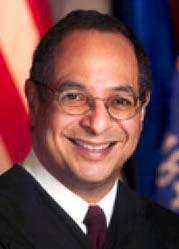
William A. McAnulty, Jr. Associate Justice (2005-2007)
William McAnulty Jr. was the first Black justice to serve on the Kentucky Supreme Court. After graduating law school, McAnulty served as a judge on the Jefferson County Juvenile Court In 1977, he ran for election to the Louisville District Court and won McAnulty served on that bench until his election to the Kentucky Court of Appeals in 1998 where he remained until his appointment to the Kentucky Supreme Court by Governor Ernie Fletcher (R) in 2005 He was elected to a full term in 2006 McAnulty resigned from the court in 2007 due to illness and passed away later that year
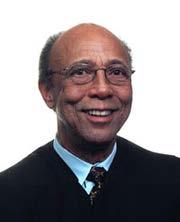
There have been no Black justices on the Kentucky Supreme Court
Michael Douglas
Associate Justice (2005-2019)
Michael Douglas was the first Black justice to serve on the Nevada Supreme Court Douglas first practiced law in Philadelphia, PA after graduating from law school before moving to Las Vegas, NV in 1982 to work as an attorney for Nevada Legal Services. He then worked for the Clark County district attorney until his appointment by Governor Bob Miller (D) to the Eighth Judicial District in 1996. Douglas later served as chief judge on that court. In 2004, he was appointed to the Nevada Supreme Court by Governor Kenny Guinn (R), where he served until his retirement in 2019 Douglas then served as acting chief judge and senior judge of the Nevada Court of Appeals until retiring in 2020 He was then appointed first chairman of the State of Nevada Cannabis Compliance Board
Patricia Lee
Associate Justice (2022-Present)
Patricia Lee is the first Black woman and first Asian American to serve as a justice on the Nevada Supreme Court. Lee spent her career in private practice while being involved in the Las Vegas legal community as a volunteer attorney for the Children’s Attorney Project in Clark County, NV and on the board for the Legal Aid Center of Southern Nevada. Lee was appointed to the supreme court in 2022 by Governor Steven Sisolak (D). Lee must be re-elected by voters in 2024 to continue serving in her current position
Term ends: January 2025
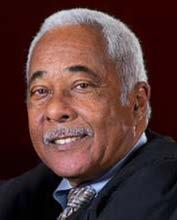
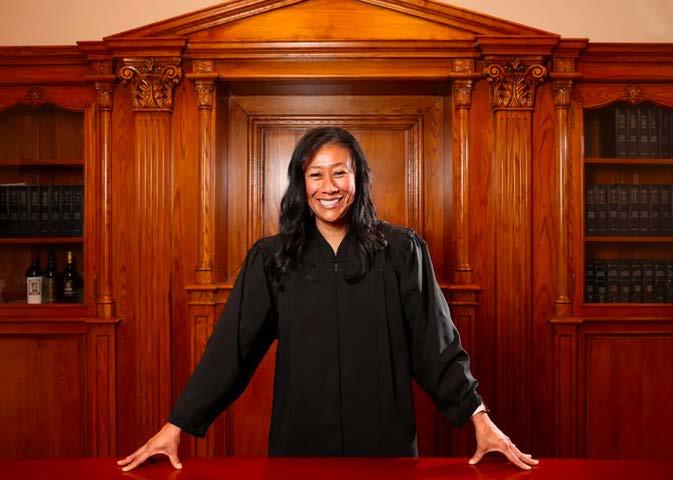
Note: Oklahoma is one of two states that has a court of last resort for criminal appeals and one for civil appeals.
David B. LewisAssociate Judge (2005-Present)
Following appointment by Governor Brad Henry (D), David Lewis became the first Black justice to serve on the Oklahoma Court of Criminal Appeals Upon graduation from law school, Lewis worked in private practice for four years before working as the Comanche County prosecutor He was then appointed as special judge for Comanche County and served in that position for nine years Then in 1999, Lewis was appointed to serve as a district judge for Comanche, Stephens, Jefferson and Cotton counties He left the court in 2005 when he was appointed to the criminal appeals court In 2013, he became the first Black presiding judge of the court.

Adrienne Nelson
Associate Justice (2018-2023)
Adrienne Nelson was the first Black person and first Black woman to serve on the Oregon Supreme Court. Nelson is also the first Black woman to serve on the United States District Court for the District of Oregon Nelson began her career as a public defender before working in private practice She then went to serve as senior attorney for Student Legal and Mediation Services at Portland State University, where she remained until she was appointed to the Multnomah County Circuit Court in 2006 In 2018, Governor Katie Brown (D) elevated Nelson to the Oregon Supreme Court, making her the first Black justice and Black judge on any appellate court in Oregon She remained on the supreme court until her confirmation to U S District Court for the District of Oregon She was nominated to that bench by President Joe Biden (D) and currently serves in that position
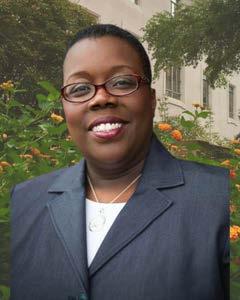
Tamika Montgomery-Reeves
Associate Justice (2019-2023)
Tamika Montgomery-Reeves was the first Black justice to serve on the Delaware Supreme Court. Upon completion of her clerkships, Montgomery-Reeves went into private practice first in New York, then in Delaware. In 2015, Governor Jack Markell (D) appointed her to the Delaware Court of Chancery, making her the first Black vice chancellor to serve on the court. Five years later, Montgomery-Reeves made history again when she was appointed to the Delaware Supreme Court by Governor John Carney (D). In 2022, President Joe Biden (D) nominated her to the United States Court of Appeals for the Third Circuit and she was confirmed later that year She joined the circuit court in 2023
N. Christopher Griffiths
Associate Justice (2023-Present)
N Christopher Griffiths is a current justice on the Delaware Supreme Court Griffiths began his legal career in private practice focusing on administrative and government law, corporate and commercial litigation, and other business litigation Griffiths also served as city solicitor for New Castle, Newport, and Townsend Griffiths was nominated by Governor John Carney (D) and confirmed to the supreme court in 2023. He must be re-nominated and re-confirmed to remain in his current position upon the expiration of his term.
Term ends: May 2035

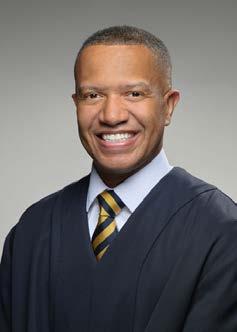
Melissa Long
Associate Justice (2019-Present)
Melissa Long is the first Black justice to serve on the Rhode Island Supreme Court Upon completion of her clerkships, Long started her legal career in Fairfax County, Virginia She then moved to Rhode Island and worked as a public defender Following her service as a public defender, Long worked for the Rhode Island Department of Public Transportation before serving as deputy secretary of state and director of administration with the secretary of state’s office In 2017, she was appointed by Governor Gina Raimondo (D) to the Rhode Island Superior Court Three years later, Raimondo nominated Long to the supreme court
-

Rick E. Lawrence
Associate Justice (2022-Present)
Rick Lawrence is the first Black justice to serve on the Maine Supreme Court. Lawrence started his career in private practice before joining UNUM Life Insurance and working in insurance claims and remained there until his appointment by Governor Angus King (I) in 2000 to serve as a judge on the Maine District Court While on the district court, Lawrence also worked as an adjunct professor at Maine Law Then in 2022, he was appointed by Governor Janet Mills (D) to the supreme judicial court To continue serving on the bench, he must be re-nominated by the governor and reconfirmed by the state Senate
Term ends: May 2029

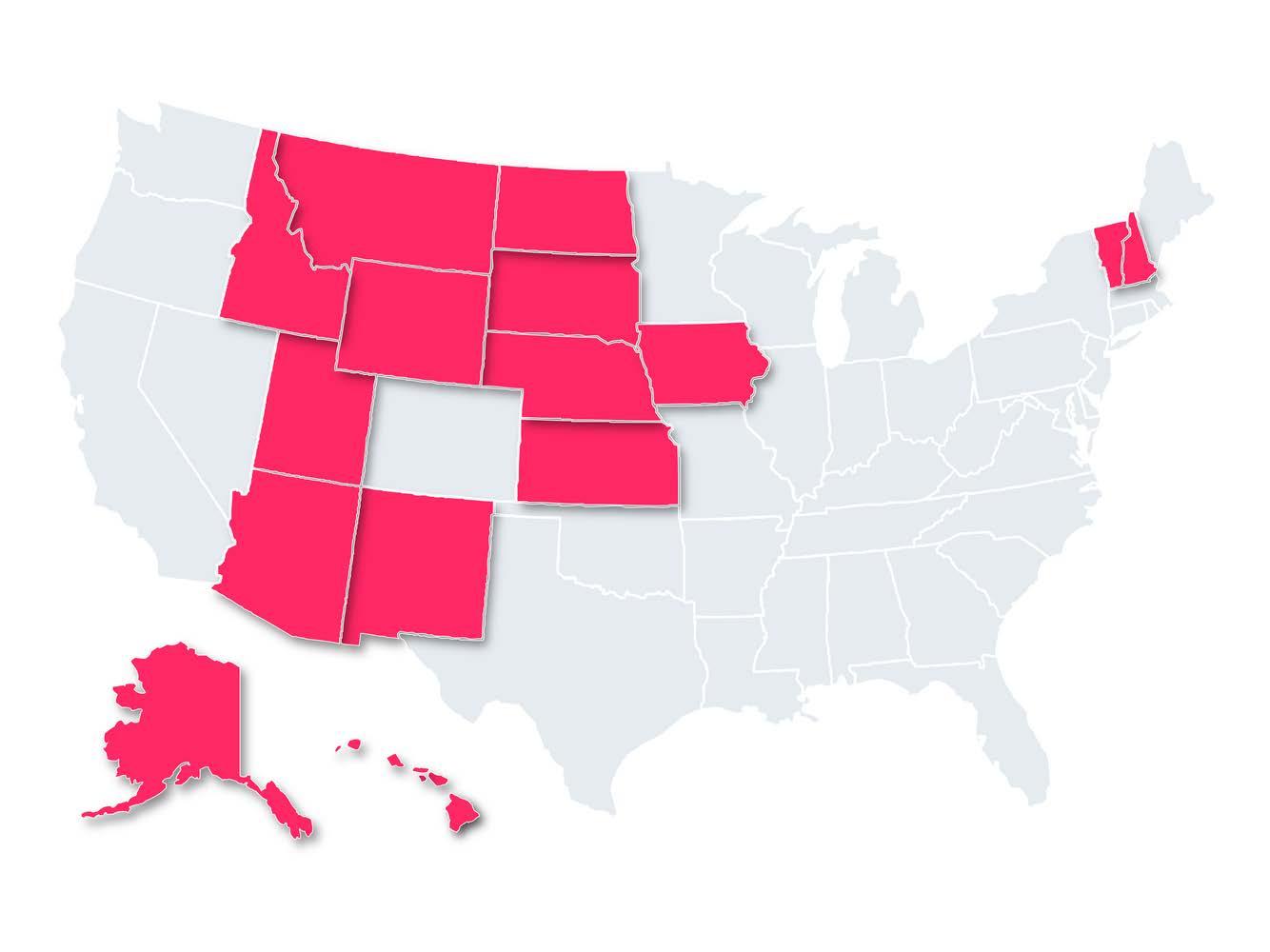
Alaska Supreme Court
Arizona Supreme Court
Hawaii Supreme Court
Idaho Supreme Court
Iowa Supreme Court
Kansas Supreme Court
Montana Supreme Court
Nebraska Supreme Court
New Hampshire Supreme Court
New Mexico Supreme Court
North Dakota Supreme Court
South Dakota Supreme Court
Utah Supreme Court
Vermont Supreme Court
Wyoming Supreme Court
VOLUME 1: FEATURING BLACK STATE SUPREME COURT JUDGES
